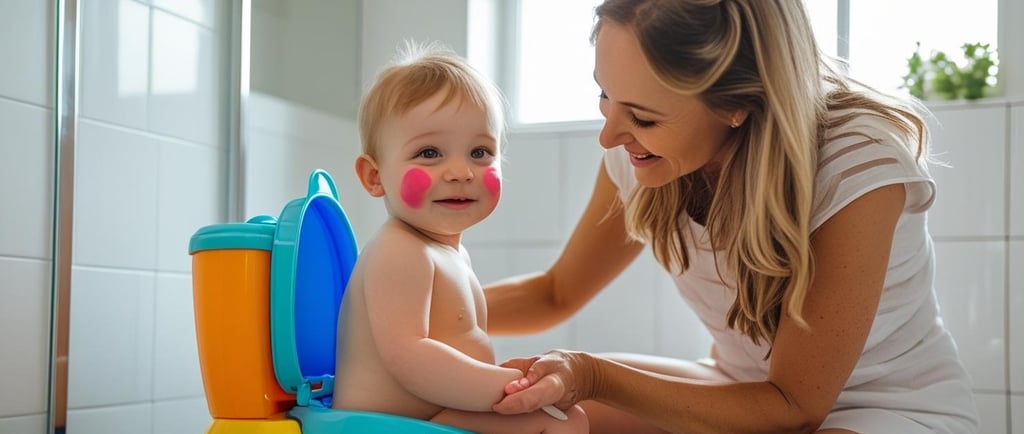Quick Potty Training
Struggling with potty training? This guide breaks down the most popular methods, pros and cons, and step-by-step tips—plus helpful product recommendations to make the process smoother for both you and your child.
7/14/20253 min read


The Best Known Potty Training Methods: A Parent’s Guide
Potty training is a major milestone in every child’s life—and every parent’s journey. But with so many approaches out there, it can be tough to know where to begin. In this blog, we break down the best-known potty training methods, the pros and cons of each, step-by-step instructions, and offer helpful product suggestions you can use (affiliate links included!).
Method 1: The 3-Day Potty Training Method
This fast-track method involves intensive training over a three-day period where your child transitions from diapers to underwear.
✅ Pros:
Quick results if done consistently
Builds independence fast
Encourages strong parent-child bonding during the process
❌ Cons:
Requires taking 2–3 days off to stay home
Not all children respond well to the fast pace
Can be stressful if expectations are too high
How to Do It (Step-by-Step):
Choose a 3-day window where you can stay home with your child.
Ditch the diapers and go straight to underwear.
Offer fluids and set a timer to take your child to the potty every 20–30 minutes.
Celebrate all successes with rewards or praise.
Expect accidents—be patient and positive.
🛒 Affiliate Pick: Use a potty chair like the Summer Infant My Size Potty to make your toddler feel like a big kid.
Method 2: Child-Led Potty Training
In this approach, you wait until your child shows signs of readiness and let them take the lead at their own pace.
✅ Pros:
Less stressful for both parent and child
Encourages autonomy and confidence
Fewer power struggles
❌ Cons:
May take longer to fully potty train
Some kids may resist even when ready
Parents must stay flexible
Signs of Readiness:
Stays dry for 2+ hours
Shows interest in adult bathroom habits
Understands simple directions
How to Do It (Step-by-Step):
Watch for readiness signs (typically between 18–36 months).
Introduce the potty and let your child explore.
Offer potty time after meals, naps, or before baths.
Praise and encourage rather than pressure.
Use stories or videos to build interest.
🛒 Affiliate Pick: Try the Potty Time with Elmo Book to make potty time fun and relatable!
Method 3: The Parent-Led Schedule Method
Here, the parent guides the child to use the potty at regular intervals based on a schedule.
✅ Pros:
Works well for structured households
Easier for daycare or babysitters to follow
Reinforces routine and discipline
❌ Cons:
May not align with child’s natural timing
Can feel controlling to some children
How to Do It (Step-by-Step):
Set a regular schedule (e.g., every 2 hours).
Prompt your child to try even if they don’t ask.
Use visual cues like a sticker chart or song.
Stay consistent across caregivers and settings.
Adjust based on your child’s response.
🛒 Affiliate Pick: Use the Potty Training Watch that reminds kids with music and lights when it’s time to go.
Helpful Tips for Any Method:
Keep extra clothes and cleaning supplies nearby.
Celebrate small victories—don’t focus on accidents.
Never shame or punish mistakes.
Keep things fun with books, songs, and sticker charts.
Be consistent—but flexible.
Common Potty Training Questions (and Answers)
When should I start potty training?
Most children are ready between 18–36 months, but each child is unique.
What if my child resists potty training?
Take a break and try again in a few weeks. Forcing it rarely helps.
Can I potty train at night too?
Yes—but it often comes later. Start with daytime and gradually phase in night training.
Are boys harder to train than girls?
Every child is different! Some studies suggest girls may train earlier, but consistency matters more than gender.
Final Thoughts
Potty training doesn’t have to be stressful. With the right approach, a little patience, and a few helpful tools, you’ll guide your child through this big step with confidence.
🛒 Explore our top affiliate picks:
To make your potty training journey smoother, easier, and maybe even fun!
Affiliate Disclaimer: This blog contains affiliate links. If you purchase through them, we may earn a small commission—at no extra cost to you. We only recommend products we trust and believe in.
Reviews
Honest product reviews to help your decisions.
Contact
contact@justasec.me
© 2025. All rights reserved.
